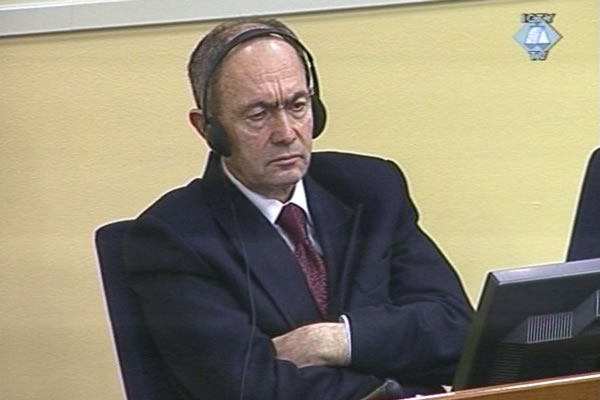Home
TOLIMIR: INTERCEPTED CONVERSATIONS ‘FABRICATED’ BY THE BH SECURITY SERVICE
In the cross-examination of former OTP investigator, the accused Zdravko Tolimir put it to her that the recordings and transcripts of the intercepted conversations between various Bosnian Serb military and police officers during the Srebrenica operation were in fact fabricated or tampered with in the ‘labs of the BH State Security Service’. The material was then surrendered to the Tribunal, he argues
 Zdravko Tolimir in the courtroom
Zdravko Tolimir in the courtroom As he cross-examined prosecution witness Stephanie Frease, who used to work for the prosecution as an investigator, General Zdravko Tolimir revisited a point in Frease’s testimony when she said that as early as in 1995 the Srebrenica investigation team leader Jean Rene Ruiz had asked the BH authorities to hand over the recordings and transcripts of the intercepted conversations between various Bosnian Serb military and police officers. Ruez had heard that they existed. The first transcripts, Frease stated, were handed over to the OTP in the spring of 1998. In Tolimir’s view, only two things can account for the three-year interval between the request and the delivery of the material.
The first reason is that in 1995 – when they received the OTP’s request – the BH authorities had no recordings or transcripts of the intercepted conversations and it follows that it took them three years to fabricate them. The alternative is that the recordings existed but because of their contents it was not in the interest of the BH army and police to hand them over to the Tribunal. In that case, a three-year delay before the material was handed over was used by the State Security Service to ‘make a selection in their labs’ of the recordings and transcripts and delete the unwanted parts.
Stephanie Frease rejected this suggestion, contending those were ‘highly trained persons’ working in the surveillance services of the State Security and the BH Army who had a responsible job, ‘like court reporters’, to write down exactly what they heard. Frease once again said there was no doubt about the authenticity and reliability of the material. ‘Mistakes are always possible but there was no pattern which would indicate there was any kind of selection’, Frease said.
Presiding judge Flugge then asked the witness if she tried to find out why only one side could be heard in some of the recordings. The accused has repeatedly insisted on that point, too. The phenomenon was investigated, Frease said, but she was not able to explain to the Trial Chamber the technical aspects.
Linked Reports
- Case : Tolimir - "Srebrenica"
- 2010-09-07 CHECKING AUTHENTICITY OF INTERCEPTED CONVERSATIONS
- 2010-08-25 STAYING IN ZEPA WAS NOT ‘A REALISTIC OPTION’
- 2010-08-24 EVACUATION OF ZEPA OR DEATH SENTENCE
- 2010-09-16 TOLIMIR: ‘SELF-EVACUATION’ OF MUSLIMS FROM SREBRENICA
- 2010-09-28 CAUSE OF DEATH OF SREBRENICA VICTIMS
- 2010-10-19 BRATUNAC INSIDER: MUSLIMS WANTED TO LEAVE AS SOON AS POSSIBLE
